Medical expert of the article
New publications
Preparations
Pills for maxillary sinusitis
Last reviewed: 03.07.2025

All iLive content is medically reviewed or fact checked to ensure as much factual accuracy as possible.
We have strict sourcing guidelines and only link to reputable media sites, academic research institutions and, whenever possible, medically peer reviewed studies. Note that the numbers in parentheses ([1], [2], etc.) are clickable links to these studies.
If you feel that any of our content is inaccurate, out-of-date, or otherwise questionable, please select it and press Ctrl + Enter.
To successfully treat sinusitis, you must first get rid of the infection that covers the maxillary sinus area. Once drainage is restored, the outflow of purulent and mucous discharge will become faster, thereby accelerating the healing process.
The choice of treatment for this disease depends on its form and severity. Usually, sinusitis tablets are used, which are combined with local treatment methods - rinsing the nasal cavity, using drops, and inhalations.
Indications of maxillary sinus pills
The tablets are prescribed for acute, subacute and chronic forms of sinusitis (right-sided, left-sided or bilateral) of various types: viral, fungal, bacterial.
Release form
Sinupret
Sinupret tablets contain plant elements that allow the medicine to have a complex effect on the patient's body. The drug helps eliminate bronchospasms and also liquefies phlegm. In addition, the medicine has anti-inflammatory, antiviral, and immunostimulating properties.
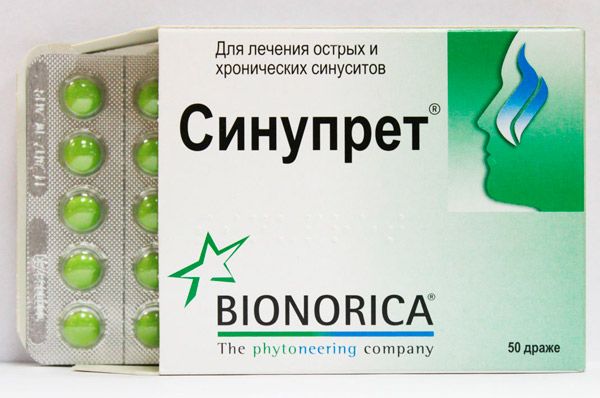
Cinnabsin
Cinnabsin is a homeopathic remedy with immunostimulatory and anti-inflammatory properties. This drug reduces swelling of the mucous membranes in the paranasal sinuses and nasal cavity, thereby facilitating the process of breathing through the nose.
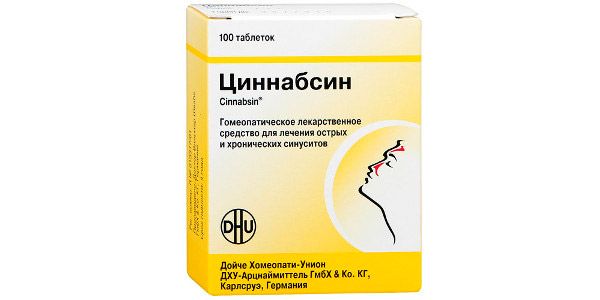
Sinuforte
The drug Sinuforte is prescribed for inflammatory processes in the paranasal sinuses. It is made from plant components - juice, as well as an extract of European cyclamen.
The medicine has anti-edematous properties - by stimulating the glandular goblet cells in the nasal cavity, it promotes significant dehydration of the mucous membrane. It has a combined effect (it also causes reflex hypersecretion), due to which it expands the natural connections between the sinuses and the nasal cavity - this allows the path to be cleared for the removal of pus and mucous secretions from the sinuses into the nasopharynx.
Guaifenesin
The mucolytic drug Guaifenesin stimulates the work of secretory cells of the bronchial mucosa, which secrete neutral polysaccharides. In addition, it liquefies sputum and increases its volume, leads to depolymerization of acidic mucopolysaccharides, activates the work of the ciliary apparatus. All these effects help to simplify the process of sputum secretion, as well as the transition of cough to a productive form.
Fluimucil
Fluimucil - tablets with mucolytic properties. This drug helps to liquefy the mucus accumulated in the nasal cavity, increases its volume, and also simplifies the process of its discharge. This mucolytic is prescribed to facilitate the process of secretion removal in sinusitis.
Mukodin
Mukodin has expectorant and mucolytic properties. It belongs to the category of respiratory function stimulants and secretolytics. The drug activates enzymes found in goblet cells of the bronchial mucosa, and also stabilizes the quantitative proportion of neutral and acidic sialomucins contained in bronchial secretions. In addition, Mukodin helps restore the elasticity and viscosity of mucus.
Antibiotics for sinusitis in tablets
Most often, for prolonged sinusitis, doctors prescribe antibiotics. Often, one course of treatment is enough to completely eliminate the infection - this allows you to avoid the procedure of puncture of the nasal sinuses.
The most effective antibiotics in tablets for the treatment of sinusitis are considered to be new generation drugs (such as Cephalosporin, Augmentin, and Azithromycin). If the patient has an intolerance to drugs from the penicillin category, he may be prescribed macrolides or tetracyclines.
Macropen or Augmentin are mainly prescribed for sinusitis. Since these drugs are multicomponent, they have a very wide range of antibacterial action. This allows you to completely destroy bacteria, and not just prevent their reproduction, as often happens when using less effective drugs.
 [ 1 ]
[ 1 ]
Amoxicillin
Amoxicillin is a semi-synthetic antibacterial drug from the penicillin group. The drug effectively eliminates bacteria that contribute to the development of the inflammatory process in the nasal sinuses, and in addition, prevents their reproduction and growth, has a bactericidal and bacteriostatic effect.
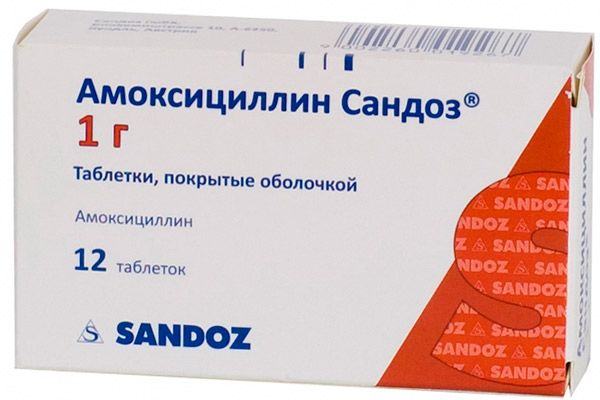
 [ 2 ]
[ 2 ]
Macropen
Macropen is an antibacterial drug from the macrolide category. It actively counteracts most gram-negative and gram-positive bacteria, and in addition destroys various intracellular microorganisms (such as mycoplasma, chlamydia and legionella).
For sinusitis, this medicine is prescribed to adults and children who are allergic to drugs from the penicillin group, or in cases where it has been found that the pathogens are sensitive to Macropen.
Augmentin
Often, in cases of purulent sinusitis caused by bacterial proliferation, the drug Augmentin is prescribed - an antibiotic from the group of 3rd generation semi-synthetic penicillins (amoxicillin). It also contains clavulanic acid.
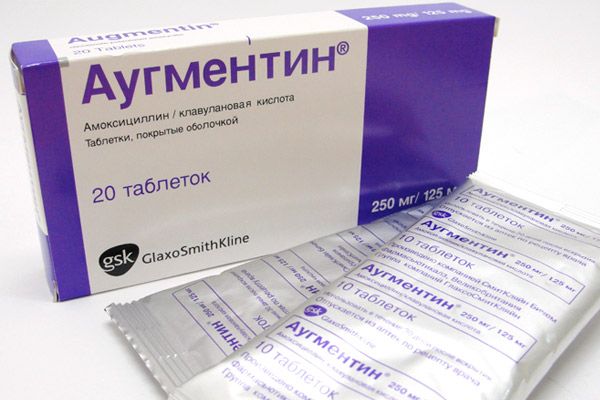
Augmentin is very effective for sinusitis, as its composition suggests a wide range of action, allowing the drug to be used for various types of flora (aerobic and anaerobic) with gram-positive and gram-negative bacteria.
The antibiotic promotes the destruction of bacterial cells by integrating into their structure. The combination of 2 active substances in one preparation allows achieving an effective result, affecting resistant strains of bacteria.
Cephalexin
Cephalexin is a drug from the cephalosporin category, which has powerful bactericidal properties. The drug is resistant to penicillinases of gram-positive bacteria, but is destructively affected by lactamases of gram-negative microorganisms.
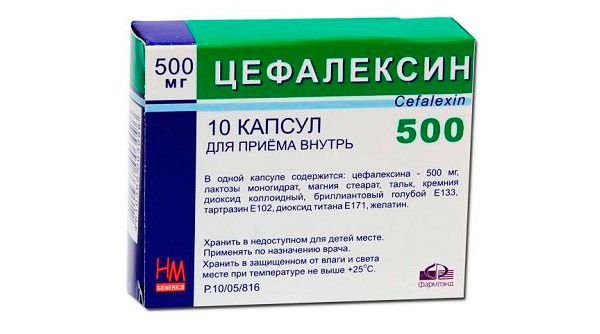
Azithromycin
Azithromycin is a semi-synthetic antibiotic that is chemically related to substances such as clarithromycin and erythromycin. The use of the drug for sinusitis helps stop the growth of bacteria, as it prevents the production of proteins necessary for them.
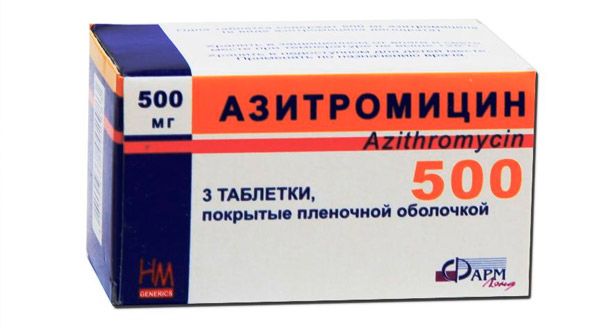
Homeopathic tablets for sinusitis
The most popular homeopathic tablets for the treatment of chronic sinusitis are Mercurius Solubilis, Silicea, Kalium Bichromicum, and Kalium Iodate. In cases where inflammation of the paranasal sinuses is accompanied by bloody discharge of a viscous consistency, the drug Hydrastis is used, and when there is severe pain in the sinuses and abundant discharge of pus, Hepar Sulphur is used.
Homeopathic preparations include only natural substances, so they almost never cause side effects and have no contraindications. But there are still some recommendations for use. Since official medicines neutralize the effect of homeopathic medicines, when using them, you need to follow these rules:
- refuse to take antibiotics and undergo physiotherapy procedures;
- Do not drink strong black tea, coffee, or carbonated water, and do not consume dark chocolate.
Anti-inflammatory tablets for sinusitis
NSAIDs usually have antipyretic and analgesic properties and therefore help reduce some symptoms.
Analgesics commonly used to relieve symptoms of inflammation in the maxillary sinuses are Ibuprofen, Aspirin, and Acetaminophen. The daily dosage of such drugs depends on how intense the pain is. But under any circumstances, you should not take them for more than 7 days in a row without first consulting your doctor.
The main principle when taking painkillers is to use small doses. First, you should drink 0.5 tablets, and only if the desired effect is not achieved, you are allowed to take the second part. This rule should be followed by everyone, especially the elderly, children and those who have low weight.
Ibuprofen
Ibuprofen tablets in case of sinusitis are used as a symptomatic anti-inflammatory drug in addition to the main course of treatment. The medicine is used to relieve pain, and also as an antipyretic.
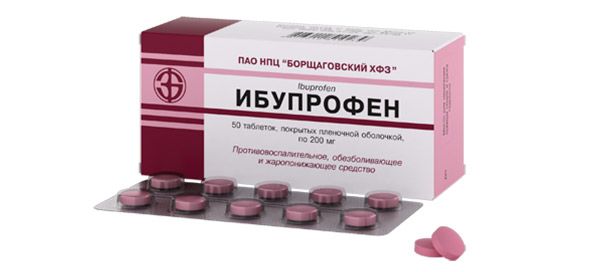
In case of diseases of the paranasal sinuses and nasal cavity, the medicine helps to relieve swelling, thus freeing the air path through the respiratory organs. As a result, breathing through the nose becomes easier, mucus comes out more freely, including from clogged nasal sinuses. In addition, the drug helps to relieve pain and a bursting sensation that occurs with advanced sinusitis (while the filled nasal cavity presses on the adjacent tissues, irritating the nerve endings).
Paracetamol and Aspirin
Paracetamol, analgin and aspirin help relieve moderate and mild pain, and also act as an antipyretic and anti-inflammatory agent. These drugs will help you quickly get rid of discomfort and pain before the main treatment methods start working.

The main properties of tablets for sinusitis are discussed using the example of the drugs Ibuprofen and Augmentin.
Pharmacodynamics
Ibuprofen achieves an analgesic effect by inhibiting the synthesis of PG, which act as conductors of the inflammatory process and discomfort. The use of the drug allows you to change the sensitivity of pain endings, as a result of which the pain subsides.
The anti-inflammatory properties of the drug are due to a decrease in the level of vascular permeability and the elimination of the inflammatory agent, reducing overall tissue swelling.
The antipyretic effect of ibuprofen, which is a derivative of phenylpropionic acid, is less pronounced. High temperature is reduced due to a decrease in the excitability of the centers in the brain that are responsible for the process of thermoregulation.
Pharmacokinetics
After oral administration, both active components of the drug are quickly absorbed from the gastrointestinal tract. When using Augmentin at a dosage of 375 mg, the maximum saturation in the blood plasma of amoxicillin will be 3.7 mg / liter, and clavulanic acid - 2.2 mg / liter; at a dosage of 625 mg, amoxicillin will reach a concentration of 6.5 mg / liter, and clavulanic acid - 2.8 mg / liter.
The drug is excreted mainly through the kidneys. With a single oral administration of 1 tablet of 375 mg (including 125 mg of clavulanic acid, as well as 250 mg of amoxicillin) or 625 mg (in this case, the amoxicillin portion increases to 500 mg), about 60-70% of amoxicillin, as well as 40-60% of clavulanic acid, are excreted unchanged in the urine within the first 6 hours after use.
On average, the half-life of these substances after taking one tablet of Augmentin at a dosage of 375 mg will be 1 hour for amoxicillin and 72 minutes for clavulanic acid. At a dose of 625 mg, this period will be 78 and 48 minutes, respectively.
 [ 10 ]
[ 10 ]
Dosing and administration
Sinupret tablets should be swallowed whole, without chewing, with water. Dosage for adults: 2 tablets three times a day; for school-age children: 1 tablet three times a day. The treatment course lasts approximately 7-14 days. If symptoms of the disease continue to appear after 7-14 days or periodically worsen in the future, you should consult a doctor.
Macropen is taken before meals. For adults, the dosage is 400 mg three times a day. No more than 1.6 g of the medicine can be consumed per day. For children with severe or moderate infections, the daily dose is 30-50 mg/kg in 3 doses. If the infection is mild, this dosage can be doubled. The treatment course lasts approximately 7-10 days.
Use of maxillary sinus pills during pregnancy
In case of sinusitis during pregnancy, only a doctor can prescribe medications. Absolute certainty is required that the benefit of the medication will outweigh the possible health risk. Usually, antibiotics are not prescribed in such cases; doctors try to use gentle methods of therapy. However, there are several medications that are allowed to be prescribed in case of sinusitis during pregnancy: Augmentin, Azithromycin, and third-generation cephalosporins. In severe cases, Spiramycin may also be prescribed.
Pregnant women are also allowed to use Sinupret - this drug is a safe and effective medicine that liquefies pus and mucous secretions accumulated in the sinuses and simplifies the process of its removal.
Contraindications
Antisinusitis antibiotics have some contraindications. They are prohibited if the patient has a tendency to allergic reactions, as well as problems with the kidneys or liver. Antibiotics are also generally prohibited during pregnancy and lactation.
Mucolytics are contraindicated when the patient has hypersensitivity to the main components of the drug. They also cannot be used by children under 18 years of age. In addition, such tablets for sinusitis are prohibited in the following cases:
- Bronchial asthma;
- Gastrointestinal diseases (stomach ulcer or duodenal ulcer);
- Renal or hepatic insufficiency.
The use of painkillers is prohibited in the following cases:
- For ulcers of the duodenum or stomach;
- For allergies;
- For children under 12 years of age.
Side effects of maxillary sinus pills
The most common side effects that may occur when using tablets for sinusitis are:
- Sneezing along with coughing;
- Problems with the functioning of the digestive system;
- Unpleasant taste and dry mouth;
- Swelling and redness of the organs of vision;
- Skin rash;
- Allergy;
- Vomiting with nausea;
- Loss of appetite.
 [ 11 ]
[ 11 ]
Interactions with other drugs
Azithromycin should not be used in combination with magnesium- or aluminum-containing antacids (such as Maalox or Mylanta), as the latter may interfere with the absorption of Azithromycin in the gastrointestinal tract.
Combined use of Macropen with carbamazepine or ergot alkaloids reduces the metabolism of these substances in the liver and increases serum saturation. Therefore, these drugs should be taken with caution in combination. Macropen does not affect the pharmacokinetics of the substance theophylline. If this drug is taken simultaneously with anticoagulants (such as warfarin) or cyclosporine, the process of elimination of the latter will be slow.
Patients taking Augmentin experienced an increase in prothrombin time and bleeding time. Augmentin should be used with caution in combination with anticoagulants. Combination of this drug with oral hormonal contraceptives may reduce the effectiveness of the latter.
Shelf life
Tablets for sinusitis are allowed to be used for 2-3 years from the date of manufacture.
 [ 16 ]
[ 16 ]
Attention!
To simplify the perception of information, this instruction for use of the drug "Pills for maxillary sinusitis" translated and presented in a special form on the basis of the official instructions for medical use of the drug. Before use read the annotation that came directly to medicines.
Description provided for informational purposes and is not a guide to self-healing. The need for this drug, the purpose of the treatment regimen, methods and dose of the drug is determined solely by the attending physician. Self-medication is dangerous for your health.

